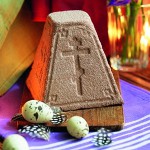Orthodox Easter in 2011
 Easter (the Resurrection of Christ) is the greatest andthe most ancient Christian holiday. Easter has no fixed date, it is a passing holiday, therefore every year the date of Easter is calculated according to the lunisolar calendar. On what date does the Orthodox Easter fall in 2011?
Easter (the Resurrection of Christ) is the greatest andthe most ancient Christian holiday. Easter has no fixed date, it is a passing holiday, therefore every year the date of Easter is calculated according to the lunisolar calendar. On what date does the Orthodox Easter fall in 2011?Let's try to understand the principle of calculating the date of Easter. There is a general rule that Easter must occur on the first Sunday following the spring full moon. Under the spring full moon in this case, the first full moon is meant after the day of the vernal equinox. This principle is followed by the Catholic and the Orthodox Church.
The date of Easter Sunday is not easy to calculate, because it is necessary take into account several factors that do not depend on each other: a fixed day for the celebration of Easter(Sunday), the cycle of revolution of the Moon around the Earth (the date of the full moon depends on it) and the cycle of the Earth's revolution around the Sun (determines the date of the vernal equinox).
To calculate the full moon date, use the special formula. If the March full moon comes earlier than 21March (the day of the spring equinox), then the date of Easter is counted from the next full moon, April. If the full moon, from which the date of Easter is counted, falls on Sunday, then Easter is celebrated a week later, next Sunday.
But the methodology used to calculate the date of Easter Sunday (Easter), the Orthodox and the Catholic Church are different. Sometimes the dates of the Orthodox and Catholic Easter coincide (for example, the Orthodox Easter in 2011 is celebrated on the same day as the Catholic Easter), but more often - no. The whole point is that the Catholic Church uses the Gregorian Paschalia, and the Orthodox church - the Alexandrian.
The Alexandrian Paschalia uses the following formula to calculate the date of Easter:
Full Moon (Y) = March 21 + [19 * [Y / 19] + 15) / 30]
In this formula, Y is the year for which the calculation is performed, [m / n] is the remainder obtained by dividing whole m by n.
If the Full Moon (Y) less than 32, then the Easter full moon falls on March.
If the Full Moon (Y) greater than or equal to 32, then you need to subtract 31 days from the received number, and you will get the date of the Easter full moon in April.
Carl Friedrich Gauss, a German mathematician, will propose a formula for calculating the date of Easter, based on the Alexandrian Paschalia. According to the Gauss formula, the date of Orthodox Easter is calculated as follows:
a = [(19 * [Y / 19] + 15) / 30]
b = [(2 * [Y / 4] + 4 * [Y / 7] + 6 * a + 6) / 7]
In this formula, Y is the year for which the calculation is performed, [m / n] is the remainder obtained by dividing whole m by n.
If the sum of a and b more than 9, then Easter will be (a + b - 9) April according to the old style. If the sum of a and b less than or equal to 9, then Easter will be (22 + a + b) March in the old style. To get a date for a new style, you need to add 13 to the received date.
For example for 2011 a = [(19 * [2011/19] + 15) / 30] = [(19 * 16 + 15) / 30] = [319/30] = 19
A b = [(2 * [2011/4] + 4 * [2011/7] + 6 * 19 + 6) / 7] = [2 * 3 + 4 * 2 + 6 * 19 + 6) / 7] = [ 134/7] = 1
It turns out that the Orthodox Easter in 2011 falls on 19 + 1 - 9 = April 11 on the old style. Add 13 days - get April 24 in a new style.
The date of Easter Sunday may fall during the period from 22 March to 25 April in the old style, respectively from April 4 to May 8 on a new. Concerning the date of Easter, the dates of many other Christian holidays are calculated.
So that you do not tire yourself with calculations, we suggest you the table of dates for the Orthodox Easter from 2011 to 2020:
| Year | 2011 | 2012 | 2013 | 2014 | 2015 | 2016 | 2017 | 2018 | 2019 | 2020 |
| date | April 24 | April 15th | 5 May | 20 April | 12th of April | 1st of May | 16 April | April 08 | April 28 | 19 April |
So you still have time prepare for the celebration of Easter - think over patterns for Easter eggs and learn how to bake a cake. We hope that our article on the traditions of the celebration of Easter will help you!














